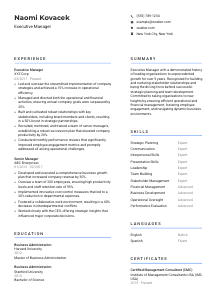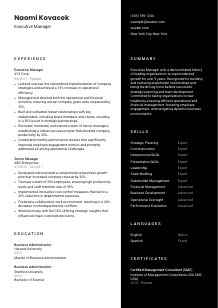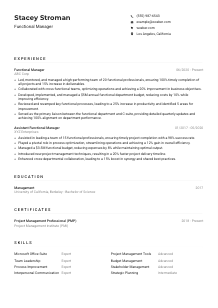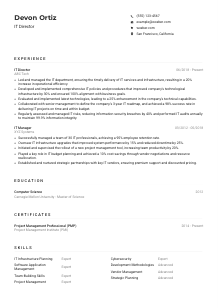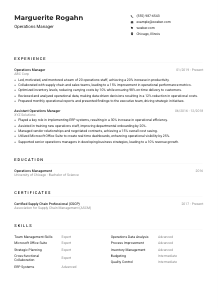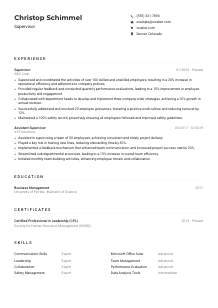Executive Manager Resume Example
Leading the boardroom, but your resume feels like a board game? Level up with this Executive Manager resume example, choreographed using Wozber free resume builder. Discover how to project your strategic leadership to align with job expectations, and make your career narrative as impressive as your quarterly reports!
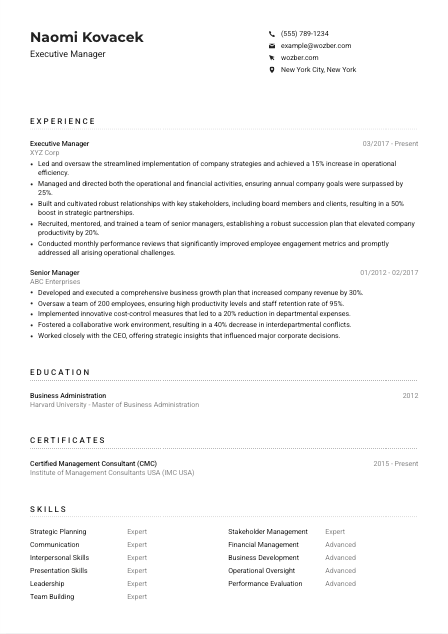
How to write an Executive Manager Resume?
Greetings, future Executive Manager! As you step into the arena of high-level management, your resume is your herald. It's not merely about listing experiences; it's about crafting a narrative that aligns seamlessly with the aspirations of the role you're eyeing.
With the Wozber free resume builder at your disposal, you're about to embark on a journey to create an ATS-compliant resume that resonates with hiring managers, perfectly tailored to the Executive Manager position. Let's dive in and sculpt your professional story into an impressive resume that stands tall in the corporate echelon.
Personal Details
Your personal details section is the doorway to your professional narrative. For an Executive Manager position, presenting this information with precision is key. Follow these steps to ensure your personal details resonate with the tenets of executive leadership.
1. Lead with Your Brand
Your name is not just a label; it's the brand you're presenting. Make sure it's prominently placed with a font that's professional yet commands attention. This is the first step in asserting your presence.
2. Align Your Title
Immediately under your name, state your job title as 'Executive Manager,' mirroring the position you're applying for. This subtle alignment prepares the hiring manager for the narrative of executive leadership that unfolds in your resume.
3. Essential Contact Information
Include your most reliable phone number and a professional email address that follows the firstname.lastname@email.com format. Ensuring accuracy in these details is fundamental to making sure opportunities find their way to you without a hitch.
4. Location Matters
Since the job requires being located in New York City, New York, boldly state your address or at least the city and state to confirm your availability and suitableness for the role, directly meeting one of the crucial prerequisites.
5. Professional Online Presence
In today's digitally-driven world, including a LinkedIn profile or a personal website can provide a deeper dive into your professional persona. Ensure these profiles are up-to-date and echo the professionalism of your resume.
Takeaway
Your personal details are your first handshake with the hiring manager. Crafted carefully, they set a professional and attentive tone for the rest of your resume. Remember, the devil's in the details. Ensure they're perfectly polished to reflect the executive leader you are.





Experience
The experience section is the cornerstone of your resume, especially for an Executive Manager role. Here's how to narrate your journey with precision and impact, aligning it with the strategic and leadership expectations inherent to the position.
- Led and oversaw the streamlined implementation of company strategies and achieved a 15% increase in operational efficiency.
- Managed and directed both the operational and financial activities, ensuring annual company goals were surpassed by 25%.
- Built and cultivated robust relationships with key stakeholders, including board members and clients, resulting in a 50% boost in strategic partnerships.
- Recruited, mentored, and trained a team of senior managers, establishing a robust succession plan that elevated company productivity by 20%.
- Conducted monthly performance reviews that significantly improved employee engagement metrics and promptly addressed all arising operational challenges.
- Developed and executed a comprehensive business growth plan that increased company revenue by 30%.
- Oversaw a team of 200 employees, ensuring high productivity levels and staff retention rate of 95%.
- Implemented innovative cost‑control measures that led to a 20% reduction in departmental expenses.
- Fostered a collaborative work environment, resulting in a 40% decrease in interdepartmental conflicts.
- Worked closely with the CEO, offering strategic insights that influenced major corporate decisions.
1. Dissecting the Job Requirements
Initiate by breaking down the job description to filter out key experiences such as strategic planning and operational oversight. This ensures that your resume speaks directly to the needs of your potential employer.
2. Structuring Your Story
Lay out your professional journey in reverse chronological order, starting with your most recent role. Ensure each role clearly displays your title, the company's name, and your tenure, setting the stage for your accomplishments.
3. Detailing Your Triumphs
Provide accomplishment-driven bullet points for each position, especially those that echo the job's responsibilities, like 'Led and oversaw the streamlined implementation of company strategies.' Quantifying these achievements makes your impact palpable.
4. Quantify Your Impact
Numbers tell a compelling story. Whether it's improving operational efficiency by 15% or boosting company goals achievement by 25%, these metrics offer a tangible testament to your executive prowess.
5. Relevance is Key
Stick strictly to experiences that underline your capability to fulfill the Executive Manager role. Extraneous details dilute the strength of your application. Direct every bullet point towards showcasing your strategic and leadership excellence.
Takeaway
Your experience section is a powerful narrative of your journey to executive leadership. By structuring it strategically and emphasizing quantifiable achievements, you demonstrate your preparedness and aptitude for the Executive Manager position. Let each line resonate with the promise of your leadership.
Education
The education section is your opportunity to showcase the academic foundation that supports your executive capabilities. For the Executive Manager role, it's essential to highlight the specific qualifications that best align with the demands of the position.
1. Highlight Relevant Education
The job description calls for a Bachelor's degree in Business Administration or a related field. If your academic background meshes with this requirement, such as a Master of Business Administration, make sure it's front and center.
2. Structure with Clarity
Maintain a clean and concise format listing your degree, field of study, educational institution, and graduation date. This straightforward approach enables hiring managers to quickly assess your academic qualifications.
3. Match the Job's Academic Tone
In tailoring your degrees, use titles that resonate with the role's requirements. For instance, citing your Bachelor of Science in Business Administration directly aligns with the specified prerequisites, confirming your suitability.
4. Cite Relevant Courses or Honors
Where appropriate, list key courses, honors, or projects that reflect your dedication and relevance to the role. For seasoned professionals, this may be less crucial but can add depth for those earlier in their careers.
5. Educational Achievements
If you've attained relevant honors or been part of significant academic or professional groups, mention these briefly. While more senior roles may focus less on these details, they can still round out your academic portrait for the hiring manager.
Takeaway
Your educational background sets the stage for your executive capabilities, providing a glimpse into the knowledge base that underpins your professional success. Tailor this section to reflect the qualifications most sought after for an Executive Manager, ensuring it complements the narrative of leadership and strategic insight.
Certificates
In the ever-evolving landscape of business and management, certifications can set you apart as a continuous learner and an expert in your field. Here's how to smartly include them in your resume, especially for an Executive Manager role.
1. Certificates that Speak Volumes
Prioritize listing certifications that are directly relevant to the role, such as Certified Management Consultant (CMC) or Project Management Professional (PMP), indicating your commitment to the management profession and your proactive approach to expanding your skills.
2. Display Pertinent Certificates
Choose certifications that highlight your strategic, leadership, and organizational abilities. Displaying these qualifications tells the story of a professional who is not only skilled but also invested in their growth and development.
3. Date Matters
Include the date of acquisition for your certifications, especially if they're recent or require renewal. This signals to the hiring manager that you're up-to-date with the latest industry standards and practices.
4. Continuous Learning
In your quest to stay at the forefront of industry trends and methodologies, continually seek new certifications or learning opportunities. This illustrates your dedication to excellence and professional growth.
Takeaway
Certificates underscore your expertise and your commitment to maintaining the cutting-edge skills needed for high-level management roles. By selecting and showcasing relevant certifications, you illustrate a readiness to lead that resonates with prospective employers.
Skills
The skills section of your resume provides a snapshot of your professional capability. For an Executive Manager, it's crucial to highlight those skills that speak directly to the responsibilities and expectations of the role.
1. Master the Job Requirements
Begin by decoding the job description to identify explicit and implicit skills needed for the role. Skills like 'Strategic Planning' and 'Leadership' are likely candidates for an Executive Manager's resume.
2. Showcase Aligned Skills
List your hard and soft skills that directly match the job description. Your adeptness in 'Financial Management' or 'Interpersonal Skills' communicates your capacity to fulfill the core demands of the role.
3. Organization is Key
Rather than listing every skill you possess, focus on those most pertinent to the job you're applying for. This prioritized approach ensures the hiring manager immediately sees the alignment between your skills and the role's requirements.
Takeaway
Your skills section is a succinct testament to your readiness and suitability for the Executive Manager role. Select and present your skills with intention, showing that you're not just a candidate for the position—you're the right choice.
Languages
For an Executive Manager, the ability to navigate diverse cultures and languages can be a distinct advantage, especially in global or multicultural organizations. Here's how to effectively present your linguistic skills on your resume.
1. Highlight Required Languages
Start by affirming your proficiency in required languages, such as English, to meet the fundamental requirement of the job description. This demonstrates your readiness to communicate effectively in the primary business language.
2. Showcase Additional Languages
If you possess additional language skills, list them to showcase your versatility and ability to engage in diverse cultural contexts. This can be particularly appealing for roles with a global scope or multicultural stakeholders.
3. Honesty in Proficiency
Clearly indicate your level of proficiency for each language, using terms like 'Native,' 'Fluent,' 'Intermediate,' or 'Basic.' This transparency helps manage expectations and demonstrates your candor.
4. The Global Context
Understanding the role's scope can guide you in emphasizing certain language skills. If the position has a strong focus on international relations, your multilingual abilities could be a significant asset.
5. Continuous Improvement
In the world of executive management, the learning never stops. If you're currently enhancing your language skills or planning to learn a new language, consider mentioning this, as it reflects your commitment to growth and adaptation.
Takeaway
Your language skills are more than a line on your resume; they're a testament to your capability to lead in a globalized world. Present them proudly, as they open doors to opportunities and signify a leader adept at navigating diverse cultural landscapes.
Summary
A well-crafted summary acts as the prologue to your professional story, offering a glimpse into your capabilities and achievements. Here's how to make it resonate with the essence of an Executive Manager.
1. Capture the Essence of the Role
Start by internalizing the core expectations of the position. Your summary should reflect an understanding of the demands of an Executive Manager, setting the stage for the detailed narrative that follows in your resume.
2. Lead with a Strong Introduction
Initiate your summary with a powerful statement about your professional identity and the breadth of your experience, such as 'Executive Manager with a demonstrated history of leading organizations to unprecedented growth.'
3. Highlight Your Uniqueness
Delve into your most relevant skills and accomplishments, tailoring them to meet the job description. Discuss the impact you've made in past roles, showcasing your ability to transcend expectations.
4. Conciseness is Key
While it's tempting to detail every achievement, remember that the summary is a teaser of your professional narrative. Aim for 3-5 lines that captivate the hiring manager's interest and encourage them to delve deeper into your resume.
Takeaway
Your summary is an elevator pitch that frames you as the ideal candidate for the Executive Manager role. By aligning it with the job's requirements and infusing it with your unique story, it not only captures attention but piques interest, setting the tone for the rest of your resume.
Launching Your Executive Manager Journey
Congratulations on mastering the art of resume crafting for an Executive Manager role. Armed with your tailored resume, created with the Wozber free resume builder, you're poised to make a compelling case for your candidacy. Remember, each section of your resume is a chapter in your professional narrative. Use Wozber's ATS-friendly resume format and ATS resume scanner to ensure your story aligns perfectly with your targeted role's expectations.
Now, step forward with confidence. Your next executive chapter awaits, and the corporate world is eager to welcome its next visionary leader.

- Bachelor's degree in Business Administration, Management or a related field.
- A minimum of 10 years of progressive experience in leadership or managerial roles, with at least 5 years in an executive capacity.
- Proven proficiency in strategic planning, financial management, and business development.
- Excellent interpersonal, communication, and presentation skills.
- Relevant certifications such as Certified Management Consultant (CMC) or Project Management Professional (PMP) are preferred.
- English proficiency is a fundamental requirement.
- Must be located in New York City, New York.
- Lead and oversee the implementation of company strategies, policies, and practices.
- Manage and direct the operational and financial activities to ensure company goals and objectives are achieved.
- Build and maintain relationships with key stakeholders, including board members, partners, and clients.
- Recruit, train, and mentor senior management staff, and establish succession planning throughout the organization.
- Conduct regular performance reviews, ensure strong employee engagement, and address any operational or employee-related issues that may arise.






